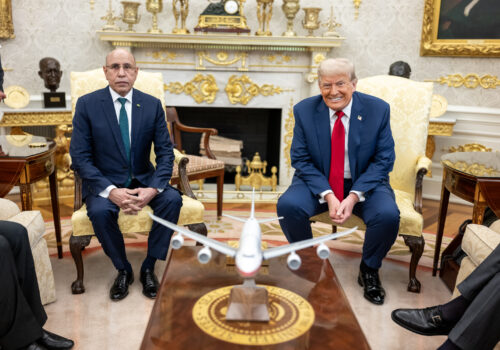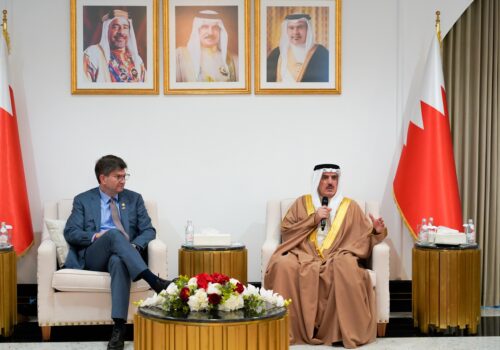Five years on, the Abraham Accords need a multilateral mission
Five years after the Abraham Accords normalized relations between four Arab nations and Israel, the historic agreements are in murky waters.
Its many proponents have been waiting for Saudi Arabia to join the pact, which is unlikely as long as the war in Gaza continues. However, even if Riyadh joins tomorrow, a larger question remains: What is the future of the accords after peace?
The Abraham Accords were much more than a peace agreement with Israel. They were the culmination of a regional pivot—the choice to pursue a policy of tolerance and regional stability rather than continue the hatred and sectarianism that have wrought so much havoc in the Middle East and the Muslim world.
To continue this movement, the accords must evolve beyond warm bilateral ties into a multilateral alliance—a bloc of Muslim-majority countries with warm relations with Israel, united not just by shared interests, but by shared values. Specifically, a commitment to tolerance, peace, and fighting Islamic extremism.
A first move should be to include Muslim-majority countries that already have warm ties with Israel, like Azerbaijan, Cameroon, Kazakhstan, Kosovo, and Uzbekistan.
With US support, the bloc could help the Abraham Accords movement reach its full potential. The created alliance could then serve as the nucleus for a powerful global movement grounded in tolerance, modernization, and strategic cooperation.
A needed framework
Currently, the Abraham Accords are just a document affirming the commitment of the signatory countries—the United Arab Emirates (UAE), Bahrain, Morocco, and Sudan—to peace, tolerance, and cooperation. Bilateral agreements were subsequently signed between Israel and the signatories separately.
But to bring the accords to the next level, the signatory countries must institute a framework, possibly similar to the BRICS model—or the intergovernmental organization including Brazil, Russia, India, China, South Africa, Egypt, Ethiopia, Indonesia, Iran, and the UAE—that would help foster further cooperation.
BRICS has no defining charter, secretariat, or common funds and relies on consensus-based decisions. However, it has a clear goal: to bring together emerging economies, increase their global influence, promote a multipolar global order, and reduce dependence on Western-dominated institutions. This framework has facilitated cooperation amongst BRICS countries to advance their goals.
The Abraham Accords coalition could adopt a similar model, with the goal of promoting interreligious and interethnic tolerance, moderate versions of Islam, and increased cooperation among its members. Once a framework is in place, the bloc should meet annually to discuss priorities, like joint counter-terrorism initiatives and educational and cultural exchanges. Most importantly, it should give each member an equal voice and make decisions by consensus. To avoid dominance by a single country, leadership should be rotational, and administrative and technical functions should be managed by a neutral secretariat.
While the rotating country chair would provide strategic leadership and agenda-setting, the secretariat could focus on ensuring clear communication between members, progress on initiatives, and support for annual summits.
A unified bloc
What many observers often overlook is the fact that the Abraham Accords were not the first establishment of warm ties between Israel and Muslim nations. Including these non-Arab, Muslim-majority countries that have established relations would be key to building on the solid base of the accords.
Two of Israel’s closest allies are Muslim-majority Azerbaijan and Kazakhstan. The leaders of these post-Soviet countries see religious and ethnic tolerance as crucial for maintaining stability. Minority rights are enshrined in the constitutions of both, and representatives of ethnic and religious communities have government-backed organizations that give them representation, such as the Assembly of People of Kazakhstan.
Such a policy has helped foster flourishing relations with Israel. Azerbaijan has not only strengthened its ties with Israel following the Gaza war, but has also become one of its largest energy suppliers. Baku has also mediated between Israel and Turkey and participated in key gas exploration in the Tamar fields off Israel’s coast.
SIGN UP FOR THIS WEEK IN THE MIDEAST NEWSLETTER
Kazakhstani President Kassym-Jomart Tokayev became the first Central Asian president to condemn Hamas over the October 7, 2023, massacre and demand the unconditional return of the hostages held in Gaza. He has also pushed for stronger bilateral ties with the Jewish state and recently received a high-ranking delegation of Israeli officials.
But Kazakhstan and Azerbaijan are not the only Muslim nations with warm ties with Israel.
In 2021, Kosovo made history as the first Muslim nation to move its embassy to Jerusalem. Cameroon expressed “unwavering” support for Israel after October 7 and abstained from voting for anti-Israel UN resolutions such as the popular December 2023 resolution calling for a cease-fire in Gaza. This year, a third Uzbek airline launched direct flights between Uzbekistan and Israel in the backdrop of increased trade between the two in recent years.
While many European nations have threatened Israel with economic sanctions, downgraded ties, or have taken diplomatic or trade action over the continuing war in Gaza, these aforementioned Muslim nations have refrained from making any demands. While some leaders have expressed their desire for a peaceful resolution to the war, they have not tried to impose decisions on Jerusalem through threats or pressure.
To be sure, new Abraham Accords members must meet particular criteria beyond establishing ties with Israel. Take Egypt, Jordan, and Turkey. While Amman and Cairo have formal relations with the Jewish state, people-to-people contact remains limited, and antisemitic narratives continue to pose challenges to deeper normalization. This includes education and cultural establishments where negative portrayals of Israel and Jews persist, contributing to deeply rooted misconceptions. While Egypt has made some progress in educational reforms, Jordanian textbooks have worsened over the past year, depicting Jews as deceitful and hostile and excusing the actions of Nazi Germany.
Once a close ally of Israel, relations under Turkish President Recep Tayyip Erdogan have significantly worsened. Since the October 7 Hamas massacre and resulting Gaza war, Turkey took a strong pro-Hamas position, instituted Islamist policies at home, and used blood libels and other antisemitic rhetoric when referring to the state of Israel. Antisemitism has also become a larger part of the overall discourse in Turkey, especially following October 7. Often, criticism of Israel is part of a domestic political play, and by helping incite hatred in the population, Turkey moves its society away from the principles of peace and tolerance.
Lastly, it is essential that while the accords seek expansion, they remain mission-focused. In May, Washington’s Middle East Special Envoy Steve Witkoff said that Armenia and Azerbaijan may join the accords. While establishing peace in the South Caucasus is crucial, Armenia, as a Christian country outside of the Middle East, is entirely unrelated to the mission of the accords and such a coalition.
Mutual interests, mutual challenges
Moreover, a larger and robust Abraham Accords would not only benefit Israel and Muslim-majority nations but also the United States as well.
One of the most significant threats to US influence and national security in the Muslim world is posed by Islamism. Groups like al-Qaeda, the Islamic State in Syria and al-Sham (ISIS), and the Houthis have weaponized “American imperialism” as a mobilizing perceived threat, fueling attacks on the United States and its allies. Past efforts against Islamism failed to win hearts and minds, but with regional backers like the UAE and Saudi Arabia, and a Muslim world tired of sectarianism, there is more room than ever for a peaceful ideology.
Today, many Muslim-majority nations are battling Islamic extremism.
Uzbekistan is dealing with heightened levels of indoctrination. Morocco fears an October 7-like attack originating from the Algerian and Iranian-backed Marxist Polisario Front that occupies portions of Western Sahara. In Azerbaijan, the Husseiniyyun, an ethnic-Azerbaijani Iranian proxy, has attempted to indoctrinate the population to carry out terrorist attacks and has itself targeted politicians, government buildings, and civilian targets. In Cameroon, Boko Haram regularly targets civilians in the country’s far north.
To be sure, there has been some cooperation in fighting extremist terrorism. Late last year, Uzbekistan and Saudi Arabia signed a memorandum of understanding on increasing cooperation in counterterrorism and money laundering. Azerbaijan has often cooperated with Israel on defense and combating Iranian influence. This year, Israeli officials, including Netanyahu, have pushed for trilateral cooperation with the United States and Azerbaijan.
But such cooperation would be much stronger if it were multilateral—and not just occasional bilateral agreements.
Such partnerships would extend far beyond defense. Many of these countries are dealing with similar issues, such as climate change, water scarcity, and adjusting to a multipolar world. They have already derived great benefits from Israeli agricultural, desalination, and other technologies in battling these challenges.
The road to deepening and expanding the Abraham Accords will not be without obstacles. Israel’s ongoing war in Gaza continues to inflame regional tensions and mobilize Muslim populations against Israel. Additionally, countries like Iran and Turkey will likely oppose any such initiative as they seek to focus on resolving the Palestinian conflict. To be sure, they do so for different reasons. Unlike Tehran, which calls for the destruction of Israel, Ankara’s stated end goal is a two-state solution.
Iranian state media have already decried the threat of expanding the Abraham Accords to countries such as Azerbaijan, Kazakhstan, and Uzbekistan. But US backing would likely render Turkey and Iran helpless in stopping its expansion much like they were unable to stop the UAE from normalizing relations with Israel in 2020.
The expansion would initially be unpopular in the Muslim world and may cause some pushback in these nations’ populations. But in the long run, they will see the benefits of the Abraham Accords ideology—more societal cohesion, stability, and prosperity.
While the focus should be on the countries themselves, the United States has a role to play. Washington could shore up this initiative by offering incentives to member countries to join such an alliance, as it has already done with the Abraham Accords. Preferential trade agreements, access to US technology, and diplomatic support would all be strong motivators.
It is important, however, that the United States not try to turn such a coalition into a bulwark against Russia or China. While Iran may be opposed to the existence of such an alliance, there is no need to pick unnecessary fights with Beijing and Moscow, especially considering that all the Abraham Accords nations—including Israel—have sought pragmatic relations with both. Attempting to utilize this alliance to reduce Russian or Chinese global influence could undermine it before it even launches.
The Abraham Accords: Much more than peace
During more than eighty years of close engagement with the Middle East, the United States has never been able to offer an alternative to the revolutionary ideologies that tore through the region. Whether it was Nasserism, pan-Arabism, Baathism, or Islamism, these schools of thought were highly successful at shaping Arab politics, leading to wars, sectarianism, terrorism and intolerance.
The ideological movement that brought about the Abraham Accords, on the other hand, emerged indigenously as leaders from countries like the UAE, Bahrain, Morocco, Sudan and Saudi Arabia realized that tolerance and fighting extremism was key to regional stability and prosperity.
As the Trump administration pushes for “commerce, not chaos” in the region, the Abraham Accords ideology is the most powerful tool to achieve that goal. As Trump noted on his trip to Saudi Arabia, the successes of Riyadh and Abu Dhabi did not come from “interventionalists” or “nation builders” but from leaders devoted to a peaceful and prosperous future.
The next phase of the Accords is about deepening a multilateral ideological alliance rooted in tolerance. If nurtured with vision and support, it could become the most effective answer to extremism across the Muslim world.
Joseph Epstein is the director of the Turan Research Center, a senior fellow at the Yorktown Institute, and a research fellow at the Post-Soviet Conflicts Research Program at Bar Ilan University’s Begin Sadat Center for Strategic Studies.
Further reading
Mon, May 12, 2025
Azerbaijan and Kazakhstan are the Abraham Accords’ new frontier
MENASource By
Joining the Accords could benefit Baku and Astana, while also helping Israel and the US strengthen engagement with the Turkic world.
Wed, Jul 16, 2025
How Mauritania-Israel normalization may boost US posture in the Sahel
MENASource By Sarah Zaaimi
If Mauritania is nearing a deal with Israel, this could be the beginning of a wider re-engagement with Sahel countries.
Tue, Jun 24, 2025
Dispatch from the Gulf: Finding middle ground amid Israel-Iran war
MENASource By Allison Minor
Congressional delegation visit coincided with Israel and Iran squaring off in a direct military confrontation.
Image: Bahrain’s Foreign Minister Abdullatif Al Zayani, Israel's Prime Minister Benjamin Netanyahu and United Arab Emirates (UAE) Foreign Minister Abdullah bin Zayed display their copies of signed agreements while U.S. President Donald Trump looks on as they participate in the signing ceremony of the Abraham Accords, normalizing relations between Israel and some of its Middle East neighbors, in a strategic realignment of Middle Eastern countries against Iran, on the South Lawn of the White House in Washington, U.S., September 15, 2020. REUTERS/Tom Brenner TPX IMAGES OF THE DAY



